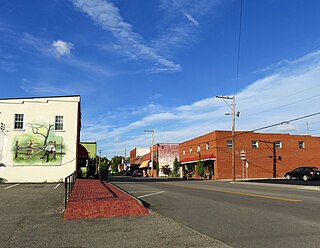Related Research Articles

Washington County is a county located in the U.S. state of Tennessee. As of the 2020 census, the population was 133,001. Its county seat is Jonesborough. The county's largest city and a regional educational, medical and commercial center is Johnson City. Washington County is Tennessee's oldest county, having been established in 1777 when the state was still part of North Carolina. Washington County is part of the Johnson City, TN Metropolitan Statistical Area, which is a component of the Johnson City–Kingsport–Bristol, TN-VA Combined Statistical Area, commonly known as the "Tri-Cities" region.

Watauga County is a county located in the U.S. state of North Carolina. As of the 2020 census, the population was 54,086. Its county seat and largest community is Boone. The county is in an exceptionally mountainous region, known as the High Country. It is the home of Appalachian State University, which has approximately 21,570 students as of Fall 2024. Watauga County comprises the Boone, NC Micropolitan Statistical Area.

Elizabethton is a city in, and the county seat of Carter County, Tennessee, United States. Elizabethton is the historical site of the first independent American government located west of both the Eastern Continental Divide and the original Thirteen Colonies.

Roan Mountain is a census-designated place (CDP) in Carter County, Tennessee, United States. The population was 1,360 at the 2010 census. It is part of the Johnson City Metropolitan Statistical Area, which is a component of the Johnson City–Kingsport–Bristol, TN-VA Combined Statistical Area – commonly known as the Tri-Cities region.

Mountain City is a town in and the county seat of Johnson County, Tennessee, United States. The population was 2,415 at the 2020 census. It is the northeasternmost county seat in Tennessee. In addition, at an elevation of 2,418 feet (737 m), it has the distinction of being the highest incorporated city in the state.

Wilsonville is a city in Clackamas and Washington counties in the U.S. state of Oregon. Founded with the name Boones Landing for the Boones Ferry that crossed the Willamette River, the community became Wilsonville in 1880. The city was incorporated in 1969 with a population of approximately 1,000. The population was 19,509 at the 2010 census and grew to 26,664 as of the 2020 census.

Watauga is a city in Carter and Washington counties in the U.S. state of Tennessee. The population was 403 at the 2000 census, 458 at the 2010 census, 361 in the 2020 census. It is part of the Johnson City Metropolitan Statistical Area, which is a component of the Johnson City-Kingsport-Bristol, TN-VA Combined Statistical Area – commonly known as the "Tri-Cities" region.

Fall Branch is a census-designated place (CDP) in Washington and Greene counties in the U.S. state of Tennessee. The population was 1,291 at the 2010 census. Some areas in Sullivan also use the Fall Branch ZIP code.

Bean Station is a town split between the counties of Grainger and Hawkins in Tennessee, United States. As of the 2020 census, the population was 2,967. It is part of the Kingsport and Knoxville metropolitan statistical areas.

U.S. Route 11E (US 11E) is a divided highway of US 11 in the U.S. states of Tennessee and Virginia. The United States Numbered Highway, which is complemented by US 11W to the north and west, runs 120.94 miles (194.63 km) from US 11, US 11W, and US 70 in Knoxville, Tennessee, north and east to US 11, US 11W, US 19, and US 421 in Bristol, Virginia. US 11E connects Knoxville and the twin cities of Bristol, Virginia, and Bristol, Tennessee, with the East Tennessee communities of Morristown, Greeneville, and Johnson City. The U.S. Highway runs concurrently with US 70 and US 25W east of Knoxville, US 321 from Greeneville and Johnson City, and both US 19W and US 19 between Johnson City and Bristol. US 11E also has an unsigned concurrency with State Route 34 (SR 34) for almost all of its course in Tennessee.

The Sycamore Shoals of the Watauga River, usually shortened to Sycamore Shoals, is a rocky stretch of river rapids along the Watauga River in Elizabethton, Tennessee. Archeological excavations have found Native Americans lived near the shoals since prehistoric times, and Cherokees gathered there. As Europeans began settling the Trans-Appalachian frontier, the shoals proved strategic militarily, as well as shaped the economies of Tennessee and Kentucky. Today, the shoals are protected as a National Historic Landmark and are maintained as part of Sycamore Shoals State Historic Park.

Del Rio is an unincorporated community in Cocke County, Tennessee, United States. Although it is not a census-designated place, the ZIP Code Tabulation Area for the ZIP Code (37727) that serves Del Rio had a population of 2,138, according to the 2000 census.

Sycamore Shoals State Historic Park is a state park located in Elizabethton, in the U.S. state of Tennessee. The park consists of 70 acres (28.3 ha) situated along the Sycamore Shoals of the Watauga River, a National Historic Landmark where a series of events critical to the establishment of the states of Tennessee and Kentucky, and the settlement of the Trans-Appalachian frontier in general, took place. Along with the historic shoals, the park includes a visitor center and museum, the reconstructed Fort Watauga, the Carter House and Sabine Hill . For over a thousand years before the arrival of European explorers, Sycamore Shoals and adjacent lands had been inhabited by Native Americans. The first permanent European settlers arrived in 1770, and established the Watauga Association—one of the first written constitutional governments west of the Appalachian Mountains—in 1772. Richard Henderson and Daniel Boone negotiated the Treaty of Sycamore Shoals in 1775, which saw the sale of millions of acres of Cherokee lands in Kentucky and Tennessee and led to the building of the Wilderness Road. During the American Revolution, Sycamore Shoals was both the site of Fort Watauga, where part of a Cherokee invasion was thwarted in 1776, and the mustering ground for the Overmountain Men in 1780.

Butler is an unincorporated community in Johnson County in the northeastern corner of the U.S. state of Tennessee. It is located along the northern shore of Watauga Lake. Butler is served by a post office, assigned ZIP Code 37640.

Bledsoe Creek State Park is a state park in Sumner County, Tennessee, in the southeastern United States. The park consists of 169 acres (0.68 km2) managed by the Tennessee Department of Environment and Conservation. The park spans much of the west shore of the Bledsoe Creek embayment of Old Hickory Lake, an impoundment of the Cumberland River created with the completion of Old Hickory Dam by the U.S. Army Corps of Engineers in 1954.

U.S. Route 23 (US 23) is a part of the United States Numbered Highway System that travels from Jacksonville, Florida, to Mackinaw City, Michigan. In the U.S. state of Tennessee, the highway travels 57.48 miles (92.51 km) in the northeastern part of the state from the North Carolina state line at Sam's Gap in the Bald Mountains to the Virginia state line in Kingsport. The entire route in Tennessee is a four-lane controlled-access highway and is concurrent with Interstate 26 (I-26) for most of its length. The freeway is also designated the James H. Quillen Parkway for its entire length in Tennessee. US 23 in Tennessee is part of Corridor B of the Appalachian Development Highway System (ADHS) and serves as a major thoroughfare in the Tri-Cities region of the state. Although I-26 is technically an east–west route, the highway predominantly travels in a north–south alignment in the state. The highway reaches a maximum elevation of 3,760 feet (1,150 m) at the North Carolina state line, which is the highest elevation on the Interstate Highway System east of the Mississippi River.

Stewarts Point is an unincorporated community in Sonoma County, California, United States and part of the "historic" Salt Point Township. Stewarts Point is located on the Pacific coast and California State Route 1, 20 miles (32 km) west of Healdsburg. Stewarts Point was originally part of the German Rancho, and was purchased by William Bihler in 1852. The unincorporated area is named for the first residents, the Stewart family, who moved to the area in 1856. In the official history for the United States Post Office, the name was said to have been given by Lt. Col. S. Stewart in 1888, however newspaper archives refer to the area as Stewarts Point as early as 1867, and attribute the name to the Stewart family who were the first residents in the area.
Arcadia is an unincorporated community located in Sullivan County, Tennessee, just outside Kingsport's eastern city limits. Arcadia, originally known as the Reedy Creek Settlement, was one of the earliest settlements in present-day Tennessee. Daniel Boone's Wilderness Road ran through this community in 1775. Arcadia is listed in the National Register of Historic Places which includes the Thomas Fain Plantation. Thomas Fain named his plantation "Arcadia" to which the surrounding community became known. Arcadia is part of the Kingsport–Bristol (TN)–Bristol (VA) Metropolitan Statistical Area, which is a component of the Johnson City–Kingsport–Bristol, TN-VA Combined Statistical Area – commonly known as the Tri-Cities region.

State Route 36 (SR 36) is a 28.6-mile-long (46.0 km) state highway, broken in two segments. In Unicoi County, it serves as the hidden concurrency of U.S. Route 19W; in Washington and Sullivan counties, it serves as a stand-alone secondary road connecting the cities of Johnson City and Kingsport.

State Route 354 is a state highway in Washington County, Tennessee. It connects Jonesborough with Boones Creek.
References
- ↑ U.S. Geological Survey Geographic Names Information System: Boones Creek, Tennessee
- ↑ Miller, Larry L. (2001). Tennessee Place-names. Indiana University Press. p. 27. ISBN 0-253-21478-5.
- 1 2 3 "NATIONAL REGISTER OF HISTORIC PLACES" -- a 54-page list of nearby places on the National Register on the web site of the City of Johnson City, p.49
- ↑ "Sifting history: Flourville mill changes hands." By Jeff Keeling, in The Johnson City News and Neighbor, September 15, 2016.
- ↑ "Washington County". Jim Forte Postal History. Archived from the original on February 7, 2015. Retrieved February 6, 2015.
